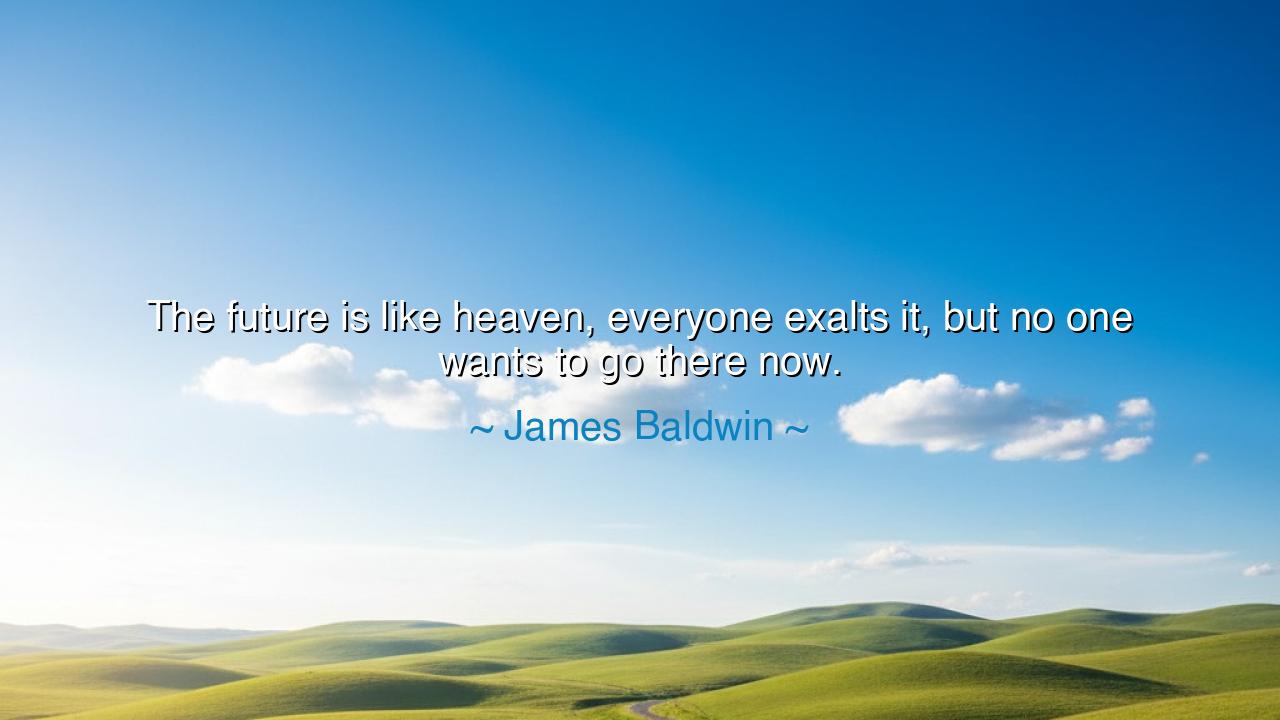
The future is like heaven, everyone exalts it, but no one wants






In the deep and vast currents of human experience, there exists a paradox that shapes the way we view the future. The words of James Baldwin, "The future is like heaven, everyone exalts it, but no one wants to go there now," capture this profound contradiction. The future is hailed as a land of promise and hope, a place where all that is broken will be mended, where our desires will be fulfilled, and where a better world will exist. Yet, when it comes time to face the present, to endure the struggles of today, we find ourselves reluctant to step into that promised land, hesitant and often fearful of the very future we so eagerly anticipate.
This contradiction has echoed through the ages. In the ancient world, philosophers like Plato and Aristotle often pondered the tension between our vision of the future and our actions in the present. Plato, in his allegory of the cave, spoke of human nature’s tendency to remain attached to the known, to the comfort of the shadows on the wall, rather than venture into the unknown light of the future. The future, much like the heavenly realm, seems distant, unattainable, and idealized. Plato’s ideal world of the Forms was a perfect version of reality, a place of ultimate truth and goodness—yet, those who saw the world as it truly was were often reluctant to leave the shadows of the cave behind.
Baldwin’s words remind us that the future holds great allure, but the present demands effort. The future is always just out of reach, like a promised land on the horizon, a place we envision as better, brighter, and free from the struggles we face now. But to attain the future we dream of, we must first face the harshness of the present, embrace the difficulties and discomfort that lie before us. The ancient Greeks understood this well. Their myths and stories, like the tragic tale of Sisyphus, were filled with characters who were cursed to forever struggle, not for the satisfaction of immediate success, but for the elusive promise of a greater reward—the future. Yet, Sisyphus was forever trapped in his task, never able to reach the summit of his labor, for he was too consumed by the end rather than the journey.
This tension between hope for the future and reluctance to face it is not just a feature of ancient philosophy but a timeless truth in human nature. The Buddha spoke of human suffering as an inevitable part of life, but also the path to enlightenment. The path toward a brighter future is through suffering, through endurance, through the overcoming of present obstacles. Yet, how many of us, when faced with a challenge, wish for the ease of the future instead of embracing the present struggle? We long for peace, but we resist the work it takes to get there.
Consider the example of Nelson Mandela, who, after spending 27 years in prison, emerged as the leader who would guide South Africa through its transformation from apartheid to a new era of freedom and reconciliation. Mandela could have longed for a future without struggle, yet he chose to engage with the present, no matter how painful. His struggle was not just for a better future, but for the chance to transform his nation in the here and now. He faced his task with the understanding that change begins not in some distant idealized future but in today's actions. The work of building a better world is done in the present, despite its burdens, and requires us to confront the hardship of the now.
Thus, the lesson Baldwin imparts is clear: the future is a dream, a vision that calls to us, promising a better world, a better version of ourselves. Yet, it is in our reluctance to face the present—our fear of the hard work it demands—that we find our deepest conflict. The future is not a place to be entered without effort, nor a place where comfort resides. If we truly wish to reach that future, we must first embrace the challenges and sacrifices of today. Just as Mandela did not wait for the future to come to him, but actively shaped it, so must we take responsibility for the present moment, shaping the future with our actions and determination.
Let us then take Baldwin’s words to heart. We must no longer wait for the future to arrive on its own, for in doing so, we miss the power of the present. Embrace the struggles of today, for they are the foundation of the future we long for. The future is not a distant place—it is what we create through the choices we make now. We must act, not in fear of the future’s demands, but in hope that the effort we put in today will lead us to the future we envision. Let the future not be an escape, but a journey that begins now, and let us be willing to walk that path with courage and resolve.






AAdministratorAdministrator
Welcome, honored guests. Please leave a comment, we will respond soon